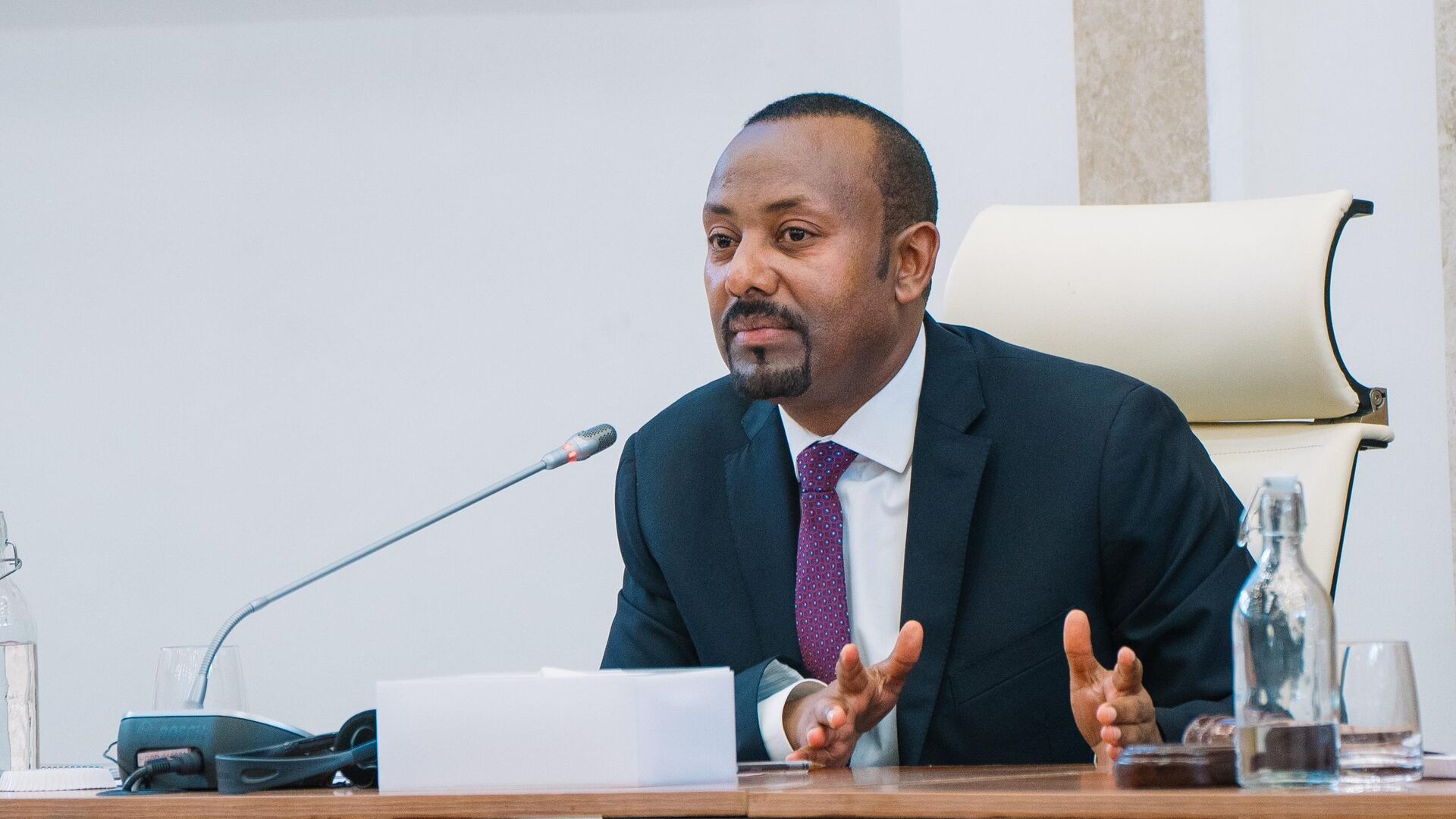https://en.sputniknews.africa/20241101/ethiopian-pm-abiy-ahmed-calls-for-sea-access-amid-tensions-in-horn-of-africa-1068982108.html
Ethiopian PM Abiy Ahmed Calls for Sea Access Amid Tensions in Horn of Africa
Ethiopian PM Abiy Ahmed Calls for Sea Access Amid Tensions in Horn of Africa
Sputnik Africa
On January 1, Ethiopia and the unrecognized republic of Somaliland signed a memorandum granting Addis Ababa access to the Red Sea. Following this, Somalia's... 01.11.2024, Sputnik Africa
2024-11-01T16:35+0100
2024-11-01T16:35+0100
2024-11-01T16:55+0100
sub-saharan africa
abiy ahmed
ethiopia
somaliland
somalia
east africa
conflict
red sea
egypt
north africa
https://cdn1.img.sputniknews.africa/img/07e8/0b/01/1068982275_0:134:2560:1574_1920x0_80_0_0_d3b162188d88333ed4066bdce19e3fde.jpg
Ethiopian Prime Minister Abiy Ahmed once again highlighted Ethiopia's ambition to gain direct access to the sea, sparking debates and heightening tensions in the Horn of Africa.As Ethiopia remains landlocked following Eritrea's independence in 1993, Abiy Ahmed has underscored that maritime access is essential to his country’s future.Abiy Ahmed’s remarks come against the backdrop of his January proposal to establish a naval base in Somaliland, the autonomous northern region of Somalia that seeks international recognition as a sovereign state. As part of the agreement, Ethiopia would consider supporting Somaliland's bid for statehood.This plan, however, has strained Ethiopia’s relations with Somalia, which regards Somaliland as part of its sovereign territory. Somalia has voiced strong opposition to Ethiopia's move.Amid these tensions, Egypt has bolstered its alliance with Somalia, sending multiple shipments of military aid to Mogadishu earlier this year.Despite the escalating situation, Abiy Ahmed clarified that Ethiopia does not intend to use military force to reclaim sea access but stands ready to defend itself if necessary.Ethiopia currently relies on neighboring Djibouti for access to the sea, making Djibouti the conduit for most of Ethiopia’s imports and exports. Recognizing Ethiopia’s position, Djibouti has extended an offer to grant Ethiopia exclusive use of one of its ports in hopes of de-escalating the regional tensions.Somaliland, strategically located on the Gulf of Aden, represents another viable option for Ethiopia as it seeks to reestablish a direct maritime route—a necessity that Abiy Ahmed warned last year could eventually become a source of conflict if left unaddressed.As regional tensions rise, Ethiopia's pursuit of sea access illustrates the complex geopolitical and economic dynamics at play in the Horn of Africa, bringing long-standing national ambitions and international alliances into sharper focus.
https://en.sputniknews.africa/20241008/ethiopias-president-taye-atske-selassie-reaffirms-commitment-to-peace-prosperity-in-region-1068605854.html
ethiopia
somaliland
somalia
east africa
red sea
egypt
north africa
djibouti
sea
horn of africa
Sputnik Africa
feedback@sputniknews.com
+74956456601
MIA „Rossiya Segodnya“
2024
Christina Glazkova
https://cdn1.img.sputniknews.africa/img/07e7/0b/07/1063380906_0:0:673:674_100x100_80_0_0_79628b4d0cd9f29291a57aa13bbf9e7a.jpg
Christina Glazkova
https://cdn1.img.sputniknews.africa/img/07e7/0b/07/1063380906_0:0:673:674_100x100_80_0_0_79628b4d0cd9f29291a57aa13bbf9e7a.jpg
News
en_EN
Sputnik Africa
feedback@sputniknews.com
+74956456601
MIA „Rossiya Segodnya“
Sputnik Africa
feedback@sputniknews.com
+74956456601
MIA „Rossiya Segodnya“
Christina Glazkova
https://cdn1.img.sputniknews.africa/img/07e7/0b/07/1063380906_0:0:673:674_100x100_80_0_0_79628b4d0cd9f29291a57aa13bbf9e7a.jpg
abiy ahmed, ethiopia, somaliland, somalia, east africa, conflict, red sea, egypt, north africa, djibouti, port, sea, horn of africa
abiy ahmed, ethiopia, somaliland, somalia, east africa, conflict, red sea, egypt, north africa, djibouti, port, sea, horn of africa
Ethiopian PM Abiy Ahmed Calls for Sea Access Amid Tensions in Horn of Africa
16:35 01.11.2024 (Updated: 16:55 01.11.2024) Christina Glazkova
Writer / Editor
On January 1, Ethiopia and the unrecognized republic of Somaliland signed a memorandum granting Addis Ababa access to the Red Sea. Following this, Somalia's authorities recalled the ambassador to Addis Ababa and annulled the agreement between Somaliland and Ethiopia.
Ethiopian Prime Minister Abiy Ahmed once again highlighted Ethiopia's ambition to gain direct access to the sea, sparking debates and heightening
tensions in the Horn of Africa.As Ethiopia remains landlocked following Eritrea's independence in 1993, Abiy Ahmed has underscored that maritime access is essential to his country’s future.
“Ethiopia deserves sea access according to any law,” Abiy Ahmed told lawmakers in Addis Ababa, as cited by media. “We are confident that our children and grandchildren will eventually realize this goal.”
Abiy Ahmed’s remarks come against the backdrop of his January proposal to establish a naval base in Somaliland, the autonomous northern region of Somalia that seeks international recognition as a sovereign state. As part of the agreement, Ethiopia would consider supporting
Somaliland's bid for statehood.
This plan, however, has strained Ethiopia’s relations with Somalia, which regards Somaliland as part of its sovereign territory. Somalia has voiced strong opposition to Ethiopia's move.
Amid these tensions, Egypt has bolstered its
alliance with Somalia, sending multiple shipments of military aid to Mogadishu earlier this year.
Despite the escalating situation, Abiy Ahmed clarified that Ethiopia does not intend to use military force to reclaim sea access but stands ready to defend itself if necessary.
“We do not seek war, nor do we want to achieve this forcefully,” he said. “There are concerns that certain countries could invade Ethiopia, but no country is capable of undermining us. We have sufficient capacity to defend ourselves.”
Ethiopia currently relies on neighboring Djibouti for access to the sea, making Djibouti the conduit for most of Ethiopia’s imports and exports. Recognizing Ethiopia’s position, Djibouti has
extended an offer to grant Ethiopia exclusive use of one of its ports in hopes of de-escalating the regional tensions.
Somaliland, strategically located on the Gulf of Aden, represents another viable option for Ethiopia as it seeks to reestablish a direct maritime route—a necessity that Abiy Ahmed warned last year could eventually become a source of conflict if left unaddressed.
As regional tensions rise, Ethiopia's pursuit of sea access illustrates the complex geopolitical and economic dynamics at play in the Horn of Africa, bringing long-standing national ambitions and international alliances into sharper focus.



